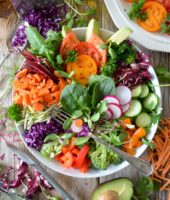Agnosticism is one of those words that gets carelessly thrown around these days. Many young individuals claim to be agnostic without really understanding what the word means.
For the unoriented, agnosticism–simply put–means believing in the uncertainty of all claims of pretty much anything. In other words, it’s about being open to the idea that the effects, existence, and other claims of an individual, organization, belief system, or again, just about anything may or may not be true.
In the context of health and wellness, nutritional agnosticism means accepting the fact that what could have worked for another person may or may not work for you. And that there are methods or disciplines out there that–depending on various factors–may or may not work for you. This is an attitude that’s being preached by registered dietitian, certified diabetes educator, and certified personal fitness trainer, Maryann Walsh.
Maryann owns her own nutrition consulting firm based in Palm Beach and has been helping people achieve their fitness goals and create better relationships with food for over 10 years now. It was through one of her Instagram posts that I first came across the term nutritional agnosticism. I sat down with her to learn more about it and other things she does for her clients.
- Can you please very clearly explain what Nutritional Agnosticism is?
Nutritional Agnosticism is being able to take a step back from all of the noise that is out there regarding nutrition so you can take an objective look at both the person and the evidence-based science that can be helpful to them. Because I am a registered dietitian with an extensive research background, I am able to evaluate more subjective or anecdotal information out there that may not necessarily have a formal study backing it yet, but could be valuable.
Each individual is different–we all have different genetics, are raised in different environments and have different psychological needs. To think that there is just one correct way of eating is not my style. I do have methods that I favor for most and that is where I usually start with most if they come to me saying that they just want to eat more balanced meals, or to achieve a certain weight loss or aesthetic goal. At the end of the day, I can’t stress it enough, everyone is different–so I will forever remain open-minded to numerous methodologies and schools of thought when it comes to nutrition.
2. What is not Nutritional Agnosticism?
Nutritional Agnosticism is not being open minded to schools of thought of practices that could be potentially harmful to people. For example, breatharianism or airatarianism. Not that I know anybody who has tried it, but this is an example of where I’d have to say “This is not safe for you to try.” the same goes for outrageous claims being made by certain individuals about some foods being able to cure severe diseases like cancer. Unfortunately, there are quite a few people out there that will say just about anything to sell their products. Being nutritionally agnostic does not make me susceptible to accepting sensationalism or false health claims.
3. Bold claims aside, are there limitations to your agnosticism when it comes to nutrition?
As mentioned above, I am not agnostic to outrageous claims made by methods, products or foods. Additionally, I am not agnostic to methods that put individuals at risk for eating disorders. Science tells us that those things do not work and are dangerous. And I stand by that.
4. You like to emphasize how every body is different, why is this so important?
Because it’s true. We all are genetically different from each other, and we all are different ages, living in different environments, we all have different traumas or experiences that may have altered not only our beliefs and perceptions of the world, but also our beliefs and perceptions of how we nourish ourselves. All of these factors contribute to making each person unique physiologically.
5. How can others start their journey towards Nutritional Agnosticism?
Others can make an approach to nutritional agnosticism by viewing the nutrition information and “noise” out there through a more objective lens and being open-minded to that fact that we never 100% know what goes on in people’s lives day to day; what health or psychological challenges they have faced or are currently facing, and / or what advantages they may have compared to others. By focusing on our own uniqueness and meeting ourselves where we are at when it comes to nutrition, we can save ourselves so much frustration trying to keep up with what everyone else is doing.
6. Lastly, how can more people learn about you?To learn more about how we can work together, you can visit my website, www.maryannwalshrd.com. You can find me on instagram @womens.nutritionist and my Facebook account is Maryann Walsh RD. My Linkedin is https://www.linkedin.com/in/maryannwalshrd/





